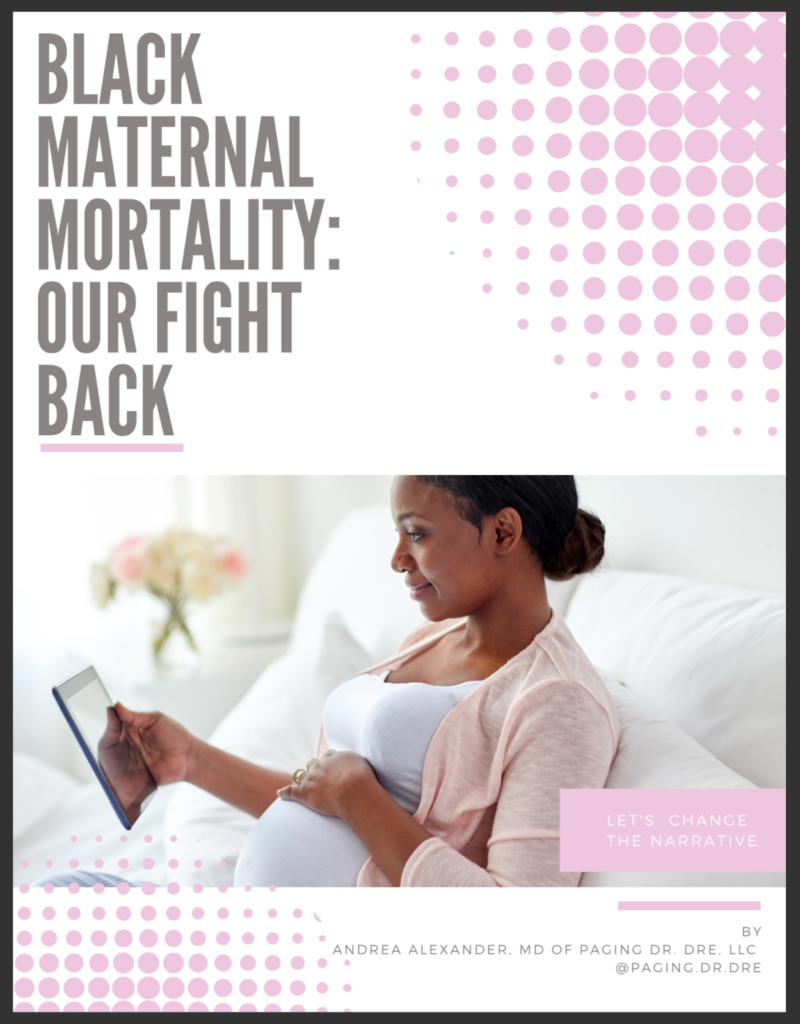( ENSPIRE Health & Wellness ) “Black Maternal Mortality: Our Fight Back” Aims To Arm Black Women With Knowledge To Advocate for Themselves and Their Newborns
ENSPIRE Contributor: Adam Cetorelli
2020 will go down in U.S. history as a year of reckoning with a predatory public health system and the ongoing national project of institutional racism. As we work toward creating a future society to be proud of—one of respect, dignity, and equity—caring for all people at every stage of life will be critical to our success. Black mothers are one group that will need specific attention, and Dr. Andrea Alexander’s new book, “Black Maternal Mortality: Our Fight Back,” seeks to give Black women tools to advocate for their lives during the particularly vulnerable life stage of pregnancy.
Dr. Alexander is an obstetrician-gynecologist who received her medical degree from Howard University in 2015. She completed her residency at the University of Texas at Houston, where she researched the impact of women’s Body Mass Index (BMI) on C-section success. In addition to being a practicing doctor and self-published author, Dr. Alexander also runs a blog about fashion, natural hair, life as a medical practitioner, and more.

“Black Maternal Mortality” outlines the disproportionate dangers associated with Black women’s pregnancies and guides Black moms-to-be through the pregnancy process, from preconception to postpartum. The book serves as a supplement, not a replacement, to ongoing prenatal care, with Dr. Alexander encouraging Black women to use the book to create questions for their physicians to ensure that they are informed about their healthcare. As Dr. Alexander argues, asking informed questions can also make doctors take a patient more seriously, and this is crucial for Black women, who are 22% less likely to receive pain medicine than are White women and are three to five times more likely to die of pregnancy-related illness (“Black Maternal Mortality,” 21).
The design of “Black Maternal Mortality” is calming and minimalist, and the book uses straightforward language that non-doctors can easily understand, alongside helpful infographics. And, importantly, it’s honest, opening with a striking personal example of Dr. Alexander’s confrontation of her team of women of color doctors’ own bias against a Black woman in their care.
“Even to this day, that doubt I had in her for that one moment, that doubt we all had, as black and brown female doctors, I could only ask myself, ‘Had our empathy for our own been clouded by cold, hard numbers and tests?’ Does one inevitably incur a subconscious bias against one’s own after countless years of training in a field dominated by older white men? I had to ask myself: ‘Am I a part of the problem?’”
Dr. Andrea Alexander, “BLACK MATERNAL MORTALITY,” 4.
This combination of accessibility and authenticity is refreshing for a book on medicine and promises to be an actually useful resource for the Black women who need it. In the following interview, I ask Dr. Alexander about her writing of the “Black Maternal Mortality,” the overlap of the COVID-19 pandemic with existing medical inequalities, and more—keep reading!

What is your main goal in publishing “Black Maternal Mortality: Our Fight Back”?
When I first came up with the idea of writing this ebook, it was because I was tired of seeing Black women die unnecessarily, and like most issues that plague the Black community, watching the remainder of the world carry on with their lives since it doesn’t directly affect them. As a Black OBGYN, I could not continue to let the current Black maternal mortality rate increase without taking action. My primary goal with publishing this ebook was to ensure that Black women had access to factual information about Black maternal health, from preconception to postpartum. I know that I cannot do it alone, but this is a portion of what I am doing to decrease Black maternal mortality rates, especially since 60% of maternal deaths are preventable with the proper education from health providers.
Why are Black women at an increased risk for mortality in pregnancy?
While unfortunately there are still a lot of uncertainties, we do know that there are a number of societal, cultural, and political reasons that contribute to the increased risk for Black maternal mortality. A few of these reasons are:
- A few studies have found that Black women have higher levels of homocysteine in their blood. This could be due to naturally occurring biochemical differences, or secondary to a decrease in folic acid (vitamin B9) in the diet. The increased homocysteine levels contribute to an increased risk of pre-eclampsia and blood clot formation.
- Black women are now getting pregnant at later ages, which increases the risk for co-morbidities and pregnancy complications, including mortality.
- Obesity rates are increasing in the U.S., and in the Black community as well
- The political climate has consistently showcased racial inequality amongst Black people—even things like unequal pay amongst women and men have caused women to be disproportionately unable to pay for adequate healthcare.
What are some things Black women should look for in healthcare settings that indicate they are being denied proper care, and what are some tools for effective self-advocacy in these situations?
Since Black women are being denied proper care in a number of ambiguous ways, it’s difficult to give a “one size fits all” response to this. Because of that, I like to focus on making sure that Black women are educated enough to identify what to look for in their hospital of choice, such as knowing the C-section rate of the hospital that their provider practices at—Is it higher or lower than the national average (~32%), and if higher, why is that? Do the nurses at the hospital you plan to deliver at look like you? If not, this may be a potential source of bias. Does the hospital you plan to deliver at have twice-a-day safety huddles to review the risk factors and care plans for each patient? Through these questions and others that I provide in my ebook, they can make an informed decision on if that hospital is best suited for them. I also provide tips on verbiage that they can use to show their medical teams that they’re astute and paying attention. I have personally seen health care providers of all ages, races, and genders straighten up when they know that they have an educated patient in the room.
How is the COVID-19 pandemic exacerbating the issues Black women face in healthcare?
The COVID-19 pandemic has been scary for everyone. However, as many know, the Black community has been disproportionately affected by the pandemic, with pregnant women having an increased risk for severe illness if affected: ICU admissions, the need for supplemental oxygen, etc. With that said, you can imagine the concerns that Black pregnant women have on top of the concerns they already had about implicit racism in healthcare. However, if I can provide just a little bit of comfort—while the risks are higher for affected pregnant women, there have been no increases in maternal mortality, NICU admissions, or neonatal respiratory disease due to COVID-19. I still, however, provide tips in my ebook to help avoid contracting the COVID-19 virus during pregnancy, as well as basic info on the COVID-19 vaccine in pregnancy. I also think this is a good time for women to review my tips on how to address implicit bias in medicine because, as we saw with the unfortunate passing of Dr. Susan Moore (a black woman physician who lost her life to COVID secondary to delayed care and racism), arming yourself with the appropriate language and key phrases is necessary.
What needs to be done at the individual and societal level to address the inequalities Black women face in healthcare?
Since the majority of the inequalities that Black women face in healthcare are embedded in institutional racism, there is a pretty long list of things that can be done, starting with closing the gap of unequal access to healthcare. On an individual level, I encourage all my sisters to obtain health insurance prior to getting pregnant, as delayed care is a HUGE risk factor in maternal mortality. I also encourage a healthy diet and exercise regime prior to conception and arming yourself ahead of time on how to prevent maternal disease and emergency plans in case of racist negligence in the hospital. At the societal level, the most important thing we can do is continue to spread factual information within the Black community about what can be done to prevent and decrease the risks of Black maternal mortality. Even if you are not a pregnant Black woman or a Black woman at all, sharing my book with someone who is could save a life. We can also encourage Congress to mandate the formation of Maternal Mortality Review Committees in every state and to advocate for more research to be done on the benefit of early prenatal testing and postpartum follow-up in Black patients.

You can purchase Dr. Alexander’s ebook “Black Maternal Mortality: Our Fight Back” here, currently at a reduced price of $20!
Related Articles: Letters to Black Mamas: A Campaign for Validation, Love, and Support, Fidelis Care Highlights National Minority Health Month







